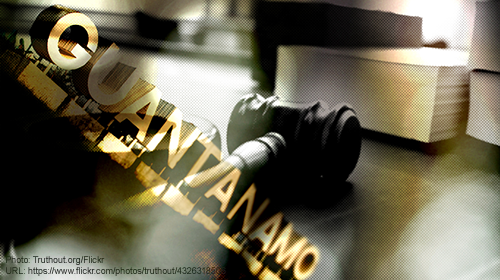
Last month, a military judge dealt a significant blow to U.S. prosecutors' efforts to suppress torture evidence in the Guantanámo military commissions.
In a ruling in the U.S.S. Cole case, unsealed last week, Judge James Pohl told prosecutors they must hand over CIA black site information to the defense attorneys of Abd al-Rahim Hussayn al-Nashiri. Back in April, Judge Pohl similarly ordered the prosecution to give extensive information to Mr. al-Nashiri's lawyers about his "4-year odyssey" through the CIA's rendition and torture program. In the new ruling, Judge Pohl confirmed the core of the earlier order and issued important findings that will reverberate not only in Mr. al-Nashiri's case but also in the 9/11 case, where one of the five defendants has already asked for similar information.
Judge Pohl found that Mr. al-Nashiri was subjected to "enhanced interrogation techniques" – the government's euphemism for torture and cruel treatment, such as waterboarding and stress positions. More importantly, he ruled that information about that abuse is relevant and helpful to the defense. In particular, it will be relevant at sentencing because Mr. al-Nashiri faces the death penalty. His lawyers have said they will argue that he cannot be executed because he was tortured by the CIA – an argument that 9/11 defense lawyers will also likely make for their own clients.
Judge Pohl also said that the use of torture techniques will impact whether any statements Mr. al-Nashiri made afterwards are too tainted to be used at trial. Under the military commissions rules, the prosecution must convince the judge that the statements were "voluntarily given" in order to use them. The prosecution has already indicated that it will seek to use statements Mr. al-Nashiri made to the FBI after he arrived at Guantánamo. But with the new ruling, the prosecution will be required to turn over the information the defense says it needs to argue that these statements were tainted by the CIA's earlier torture and abuse.
Judge Pohl's order requires the prosecution to give the defense lawyers 10 categories of information, including where Mr. al-Nashiri was held, the conditions in each site, whom he interacted with, and how he was rendered from site to site. What's not clear is the extent to which the prosecution will seek to provide summaries or other substitutes for some documents or to redact the names of personnel. According to Mr. al-Nashiri's lawyers, this will be litigated in the coming months. Still, the ruling has definitively established that the information is relevant and helpful to the defense, and any new requests by the prosecution to narrow what it has to turn over will be limited by the ruling.
That's a sea change, although a long-delayed one on a fundamental fair trial right: access to evidence. Judge Pohl has decided to step down from this case to concentrate on the commission trial of the 9/11 defendants. It's now up to his successor to ensure this important decision is properly implemented.
Learn more about torture and other civil liberties issues: Sign up for breaking news alerts, follow us on Twitter, and like us on Facebook.
Stay informed
Sign up to be the first to hear about how to take action.
By completing this form, I agree to receive occasional emails per the terms of the ACLU's privacy statement.
By completing this form, I agree to receive occasional emails per the terms of the ACLU's privacy statement.

